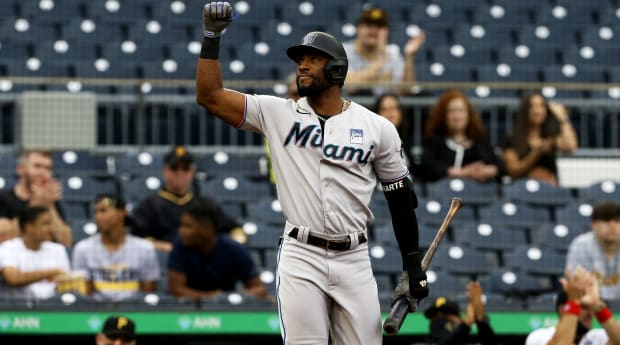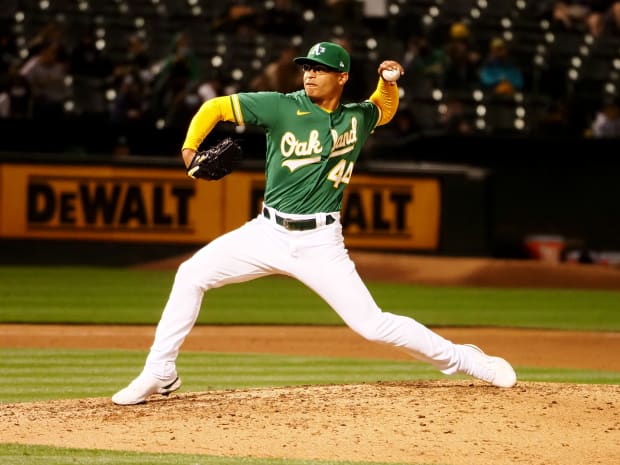It's a rare deadline deal, a one-for-one trade of major-league players that makes sense for both sides.
Last year, the Marlins brought in Starling Marte on a move that was bold and fun and a little unexpected. They’re sending him out in the same way.
Miami’s Wednesday afternoon deal with Oakland will send Marte to the A’s in exchange for pitcher Jesús Luzardo—a one-for-one swap that trades one of the best rental bats on the market for an intriguing young pitcher. (Miami will pay the $4 million remaining on Marte’s contract.) For Oakland, it’s a clear message about how the team views its playoff chances, with the front office trying to make a statement as it holds on to a wild-card berth. For Miami, it’s a big swing on a pitcher who has lost some of his prospect luster but still has the potential to bolster an exciting, young rotation. The result is a deadline move that feels somewhat rare—a one-for-one deal of major-league players, between two teams in quite different places, that nonetheless makes sense for both sides.

Let’s start with Oakland. A playoff spot seems highly likely for the A’s at this point, but so, too, does their third wild-card exit in four years. To improve their chances of a serious, sustained run, they needed to create some action at the deadline. And this more than qualifies: Marte was one of the strongest hitters available. The 32-year-old has a long track record of consistent production but is currently having one of his best seasons yet at the plate (136 OPS+). As a team, Oakland’s offense has been solid but not spectacular, and this is the sort of addition that might help push them over the edge. They don’t need Marte to play his traditional centerfield—though he might—but wherever he ends up, a trio of him, Ramón Laureano and Mark Canha should mean that one of baseball’s strongest outfields will now be in Oakland.
Which, of course, comes at a price—even for a short-term rental. But this is one that seems logical for the A’s. After they acquired Luzardo at the deadline in 2017, he eventually rose to become not just their top overall prospect, but one of the top pitching prospects in all of baseball. He’s certainly shown glimmers of that promise. But he’s also grappled with injuries, and he’s in the middle of a dreadful season that saw him sent back to Triple-A, where he didn’t seem to benefit from the change of scenery. This doesn’t mean that he won’t eventually get back on track. But it does mean that he seemed to be having difficulty doing it in Oakland. And given the other pitching the team has developed recently—Cole Irvin and James Kaprielian—it makes sense that the front office would be willing to part with Luzardo.
And it makes just as much sense that he would receive strong interest from the Marlins. This is an organization that has grown a strong reputation in recent years for working with young pitching, and there are still reasons to believe in 23-year-old Luzardo, his velocity chief among them. He faces a wide range of potential outcomes here. But with four-plus years of team control remaining, there’s space to entertain all of them, and if he ends up being closer to a middle-of-the-rotation starter than to the ace he was originally projected as—in exchange for two months of Marte and $4 million, for what could be four seasons to come, that should be more than satisfying for Miami. And who knows? Maybe, with the right tweaks, he still is that top-tier talent. Maybe he’ll end up working in the bullpen, where he debuted with success in 2019, or maybe he won’t have success with any of the above. But the potential shines brightly enough to be a chance worth taking.

The Marlins could have flipped Marte for a prospect package; as of a few days ago, that seemed likely, with rumors buzzing around teams like the Giants, Yankees and Astros. Instead, with the A’s, they found a trade partner offering a single, high-upside player who could potentially have a serious impact soon. Crucially, it continues to establish Miami’s rotation as a real strength. With the right breaks—particularly when it comes to health—a starting five of Luzardo, Sixto Sánchez, Sandy Alcantara, Trevor Rogers and Pablo Lopez could easily end up being among the best in MLB. The oldest of that group is just 25. In other words, there’s an awful lot to like here, even if it should take some more action to translate to a winning team. It’s a rotation that could set the team up for remarkable success—or at least the ability to trade from a place of strength, if the Marlins eventually decide to bolster their lineup, by giving them the option to move one or more of these pitchers while still keeping enough depth for a good rotation.
Marte, unsurprisingly, was the subject of significant trade chatter this July. But there wasn’t much talk about a move like this—to a team who was unlikely to be able to extend him, like Oakland, or in exchange for a single major-leaguer, rather than a prospect set. Which might seem familiar in tone, at least, if not in substance. Rewind to when Miami acquired Marte last August. There was widespread expectation that he would be sold—he was one of the best hitters on the market. But to be bought by the pandemic-hodgepodge fringe contenders, the Marlins? It wasn’t the biggest splash of the deadline. But there was a strong argument that it was the most intriguing. Which fits this, too. There was, again, widespread expectation that Marte would be traded—still one the best hitters on the market! But to the A’s, apparently not content to settle for another wild-card loss, straight up for a pitcher like Luzardo? There should be bigger trades to come this deadline. But there might not be another one that is as straightforwardly fun.
More MLB Coverage:
• How Max Scherzer Fits With the Three NL West Contenders
• The Twins Will Sell, But What Approach Should They Take?
• It's Decision Time for the Yankees As Trade Deadline Looms
• Inside Alex Cora’s Second Chance After Scandal